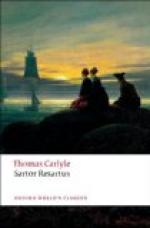|
This section contains 7,047 words (approx. 24 pages at 300 words per page) |

|
SOURCE: "Carlyle: The World as Text and the Text as Voice," in The History of Scottish Literature, Volume 3, edited by Douglas Gifford, Aberdeen University Press, 1988, pp. 153-68.
In the following essay, Watson examines the events in Carlyle's life which led him to the philosophy presented in Sartor Resartus. Watson then studies that philosophy as Carlyle reveals it through the course of Sartor, noting that Carlyle's vision is a religious one, without the concept of a personal God, a vision in which it becomes essential to recognize the power of symbols and to be able to see through them.
Carlyle occupies a unique place in British cultural history. As a social historian, he was possessed by a vision of human fate which was essentially poetic. As a nineteenth-century intellectual, his impatient and iconoclastic mind created nothing less than an early version of modern semiotic study which claimed a role...
|
This section contains 7,047 words (approx. 24 pages at 300 words per page) |

|


